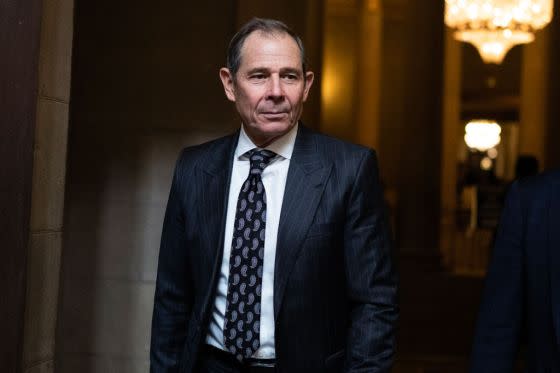
Soon after former Rep. Matt Gaetz withdrew from consideration to be President-elect Donald Trump’s attorney general, Steve Bannon had a message for his Utah audience.
Gaetz believed that four senators—enough to tank his nomination—were “hard no’s” on his confirmation. They were, according to Bannon: outgoing Republican Leader Mitch McConnell, moderates Lisa Murkowski and Susan Collins, and Sen.-elect John Curtis of Utah. That led Bannon to tell Utahns that they had a “prooooblem” in the form of the “worse-than-Romney clone” who would be representing them.
Curtis, a member of the House of Representatives who defeated a Trump-endorsed candidate in the Beehive State’s Senate primary in June, never made a public statement on his vote regarding Gaetz. But the former congressman’s speculation—and Curtis’ stated willingness to be an independent voice—led some in MAGAworld to identify the incoming senator as a possible swing vote on Trump nominations and, like outgoing Sen. Mitt Romney, a potential thorn in Trump’s side throughout the president’s second term.
Advertisement
Advertisement
Are they right?
“During the campaign, people would try to use a litmus test: Are you like Mike Lee or like Mitt Romney? And I was just very clear, like, ‘I’m like John Curtis,’ and you don’t have to guess who John Curtis is,” Curtis told The Dispatch in an interview in his temporary basement office in the Russell Senate Office Building. “Somebody like Steve Bannon is lazy. He wants to use some type of stereotype to decide who I am without even looking at my voting record.”
The senator whom Curtis will replace agreed. “I pity anybody who was a clone of mine,” said Romney, who recently downplayed his own legacy in an interview with CNN. “I think John Curtis has demonstrated by his service in the House and prior to that in Utah that he follows his own drummer, and anyone who thinks that they can predict how he’s going to respond in a certain circumstance will be, I think, surprised.”
Curtis told The Dispatch he will forge an independent role in the Senate, rooting for Trump and his administration while not being afraid to criticize the president when he believes it’s necessary. He says he wants Trump to be “not just successful, but wildly successful” on taming inflation and securing the southern border, but also that he believes expressing disagreement when the opportunity arises is part of his role.
Advertisement
Advertisement
“When he’s doing something in line with Utah’s values, I’m wind at his back. When he’s not, I’m not afraid to say, ‘I see this differently than you,’” Curtis said. “And I actually think that’s healthy for the president, and I think that that’s my role as a U.S. senator in helping him be as successful as he can be.”
Curtis noted that, as a member of Congress, he voted in line with Trump’s preferred positions 91 percent of the time, according to FiveThirtyEight—more often than some Trump Cabinet nominees like Rep. Elise Stefanik (78 percent) and former Rep. Lee Zeldin (89 percent). Romney, by comparison, voted with Trump just 75 percent of the time.
Where did Curtis disagree with Trump on policy? In other words, where did Trump contradict Utah’s values?
“He spent too much money,” Curtis said. “Utahns are very thrifty. We’re very, very fiscally conservative, and under his watch, the deficit increased dramatically. And that would be, if you go back to that 9 percent when I didn’t vote with him, you would see that a high percentage of that was related to financial issues—the budget and deficit.” One day after our interview, Curtis voted alongside other fiscal conservatives like Rep. Chip Roy to shoot down a Trump-endorsed continuing resolution (CR), that would have averted a government shutdown but raised the debt ceiling until 2027. Curtis also voted against the CR that ultimately passed Congress, which did not include the debt ceiling provision.
Advertisement
Advertisement
More in Politics
As he enters the Senate, Curtis will need to balance his desire for independence with the demands of partisan unity, but he’s displaying a willingness to work with people he disagrees with. In a recent interview with Deseret News, he indicated a speech given for the dedication of a statue of Martha Hughes Cannon, a Utahn suffragist, offered a clue to his thinking. “Martha Hughes Cannon’s principles drove her to stand up, speak out, and even stand alone in order to lead,” he said in the speech. “She also recognized the need to stand with key allies and important alliances in her cause.”

Sen. Mitt Romney visits with Rep. John Curtis (second from right) and other guests during the dedication ceremony for the statue of Martha Hughes Cannon in the U.S. Capitol Visitors Center on December 11, 2024, in Washington, D.C. (Photo by Chip Somodevilla/Getty Images)
Now, where does Curtis draw the line between going it alone and respecting his alliances? He told a story about partnering with Rep. Pramila Jayapal of Washington, the outgoing head of the Congressional Progressive Caucus, on a bill to reduce suicide, which he said was a “Utah value” and a value for Jayapal’s Seattle-area constituents. “It’d be hard to find two people more diametrically opposed on their political philosophies, but my experience is that everybody has some type of cross-section with me, where we care about the same thing,” Curtis told The Dispatch. “And so, building an alliance doesn’t mean, ‘Hey, they have to be just like me.’ It means there’s a piece of them that connects with a piece of me.”
Curtis honed those bipartisan instincts as the popular mayor of Provo, Utah, a nonpartisan office he held for two terms after a brief stint as a county Democratic Party chairman (he became a Republican prior to running for mayor in 2009). First elected to Congress in a 2017 special election, Curtis did not vote for Trump in 2016. He did, however, in subsequent presidential cycles.
“One of the differences was: I was a mayor, a nonpartisan mayor, and in 2020 and 2024, I represent the Republican Party,” he said. “I feel a duty and obligation to promote the Republican Party and be part of the Republican Party, and that was a pretty big, distinct difference between 2016 and the other elections.”
Advertisement
Advertisement
Once in Congress, Curtis reliably voted with his party, including voting twice against impeaching Trump.
When Trump was accused of pressuring Ukrainian President Volodymyr Zelensky to investigate Joe Biden, his likely 2020 opponent, in exchange for military aid, Curtis argued that Trump’s actions did not rise to the level of abuse of power and obstruction of Congress. “I’ve tried throughout this process to keep an open mind, but the articles of impeachment before me have made this vote a rather easy decision. I will be voting against these two charges,” he said at the time. “That said, my decision should not be inferred to mean that I’m happy with all of the President’s actions—but that is not the vote at hand. I’m being asked to help remove a duly elected President and I do not feel that his actions have met that high standard.”
In the aftermath of January 6, Curtis signed a joint statement with Reps. Dan Crenshaw, Nancy Mace, and Roy that castigated Trump for his actions surrounding the certification of the 2020 election. “We condemn the President for the words and actions which contributed to these events, and encourage every member of Congress to similarly condemn,” the statement read. “While we do not venture to make legal judgement of the president’s intent regarding Wednesday’s demonstration, his actions were reckless. No President should ever, among other things, promote clearly unconstitutional theories that risk the stability of our nation and, in particular, do so to the detriment of the peaceful transition of power.”
Still, the four ultimately opposed impeachment due to the alacrity with which then-House Speaker Nancy Pelosi pursued it. In their view, the rushed effort ignored due process and threatened to inflame “an already starkly divided nation by politicizing what should be a serious and thoughtful bipartisan review.”
Advertisement
Advertisement
In our interview, Curtis stood by both votes. Of the first impeachment, he says: “I went to the hearings. I studied it, looked at it, listened to it, and in my opinion, there was not an impeachable offense.” And on the second: “The second time around, nobody got to do that. Nancy Pelosi did what I call a 48-hour impeachment—no witnesses, no testimony. What a travesty of justice. Like, you can’t impeach a president of the United States without him making a statement, without witnesses.”
In that regard, Curtis stands in contrast to Romney, who voted to convict Trump both times. While the senator-elect objected to Trump’s actions, he didn’t favor removing him. However, Curtis may still face comparisons with Romney—and the ire of leading MAGA figures—depending on how he votes on Trump’s unconventional cabinet nominees.
Curtis was spared from having to vote up or down on the Gaetz nomination, but he will still need to decide on the likes of Pete Hegseth for defense secretary, Kash Patel for FBI director, Robert F. Kennedy Jr. for head of the Department of Health and Human Services, and former Rep. Tulsi Gabbard for director of national intelligence.
Before he met with Patel more than a week ago, Curtis listened to Patel’s book, Government Gangsters, and spoke to people who had worked with him. He met with Hegseth the day before talking to The Dispatch, and planned to take a similar approach in learning more about him.
Advertisement
Advertisement
“Particularly on something as important as the position that we’re considering Mr. Hegseth with, I want to be able to spend that type of time,” Curtis said. “I asked him—because he has several books—which books he would recommend I read that would tell me most about him. I asked him for people who I could talk to, who could tell me about him.”
Curtis spoke positively about his 30-minute meetings with Patel and Hegseth, but said he gave neither any indication how he would vote. He declined to comment on their controversial past statements, including a recent report that Hegseth had said, in the aftermath of the riot, that antifa members were impersonating Trump supporters on January 6, and Patel’s 2023 comment that he wanted to “come after” the media.
“All of these nominees—anything that they’ve said gives me pause, right? But I also get this as an elected official that reads about myself in the paper all the time and am purported to have said things,” Curtis said. He brought up reports speculating he would vote against Gaetz, a subject he said he never discussed with Gaetz or the transition team. “Those are the types of things that make somebody like me say, ‘No, I need to do a deeper dive than just what I hear or read out there.’”
EMEA Tribune is not involved in this news article, it is taken from our partners and or from the News Agencies. Copyright and Credit go to the News Agencies, email news@emeatribune.com Follow our WhatsApp verified Channel




